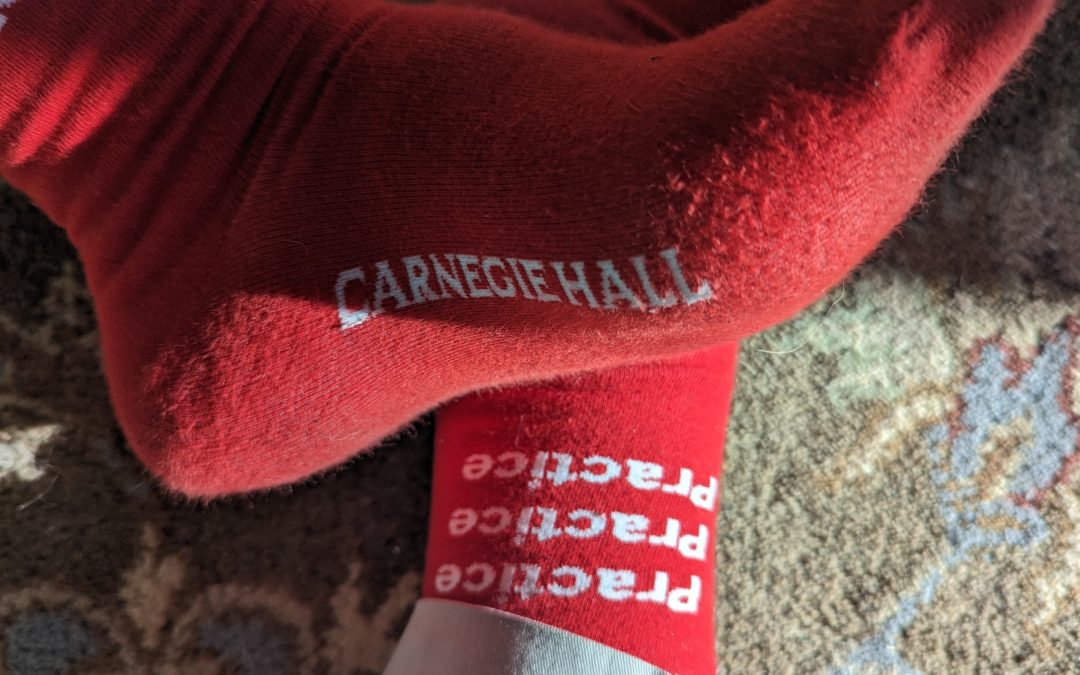At the beginning of March, I had the chance to play at Carnegie Hall for the first time. I have had music that I’ve written performed there before, but I’ve never been there when it happened. I’ve also never been playing on the concert. The old saw about how to wind up in the Isaac Stern auditorium is less true today than it used to be.
It’s still true in some senses, but there are two Carnegie Halls today. There is the one where you have to “practice, practice, practice.” The other one is how the hall sustains itself. Touring companies put together a package with a conductor or conductors, they get choirs (often high school groups) to sign up. The groups travel to the city for a long weekend and have a couple of rehearsals. Then they rent Carnegie Hall and have a performance on a Tuesday night when the room isn’t being used. The Hall makes money. The kids get to say they performed there. Everyone wins. So today, we really need another sock that says, “Practice, practice, practice…or sign up with a tour company and pay some money.”
I play for Blue Valley Northwest High School in Kansas City. They signed up for a tour. They got selected to be a featured choir. They were doing a piece of mine that they had commissioned. It was a free trip to New York for me, so I went knowing that “practice, practice, practice” isn’t the only way onto that stage anymore.
The text was written by Cass Bryant, a student that went through the program.
“It is not to see / It is not to hear / but to weather a force / It is not conventional strength / not a force so physical / nothing so brutish as a bodily blow / but the softest most gently consuming thunder of voices / weilding the sounds of pain / the chimes of rejoice / the clashing chords of conflict / and the sweet silence of its resolution / so may we be caught in their chorus storm”
The setting I wrote is my hommage to Bruckner, and I was glad to be there to hear it. The hall sounds amazing. What I wasn’t prepared for was the experience of doing it.
I went into it with my eyes open. I knew we were there because we had paid. It was still cool. When I walked down the hall and saw all those manuscripts on the walls from so many of my heroes, I didn’t care so much about how we got to do the gig. Messiaen, Joan Tower, and Roy Harris are all up there on the wall. You rehearse in rooms with posters of concerts from Stern and Bernstein and all the rest of the giants.

I also went into it with my eyes open about the problematic nature of Andrew Carnegie. Like all stories, his is complicated. He essentially became the richest man in the world and then gave all his money away. He gave us things like Carnegie Hall. In his seminal essay, “The Gospel of Wealth” he openly says the quiet part out loud in a way that is somewhat refreshing.
He points out that modern society is different than the Sioux Nation. When he visited them, the chief’s housing was the same as everyone else. “It was just like the others in external appearance, and even within the difference was trifling between it and those of the poorest of his braves. The contrast between the palace of the millionaire and the cottage of the laborer with us to-day measures the change which has come with civilization.”
He then goes on to explain that in order to have modern society and conveniences, it’s necessary for industrialists to exploit their workers and amass huge piles of wealth. Then, that same industrialist should give the money back to society in the way that’s best for it.
“Now wait,” you might say, “shouldn’t you just pay people a decent wage instead of exploiting your workers to make millions of dollars?” No, says Andrew Carnegie. Poor people don’t manage money well. They would just drink it up. “Much of this sum if distributed in small quantities among the people, would have been wasted in the indulgence of appetite, some of it in excess, and it may be doubted whether even the part put to the best use,that of adding to the comforts of the home, would have yielded results for the race, as a race, at all comparable to those which are flowing and are to flow from the Cooper Institute from generation to generation. Let the advocate of violent or radical change ponder well this thought.”
Anyway, the hoi-polloi have never known what’s good for them. Better a few people that know best give them concert halls and libraries than giving them more money directly. It’s actually not far off from Plato’s Republic. Philosopher rulers is the way to go. Especially, if you’re Andrew Carnegie, super-rich philosophers.
And yet, knowing all this, I still found it to be a very cool experience to be there playing on that stage where so many careers have been made. So, I’m a mass of contradictions, just like Carnegie himself. At least he came from a time when people believed that the super-rich were supposed to give all their money away to prevent society from collapsing. That time seems a different world than the one we live in today.

Recent Comments